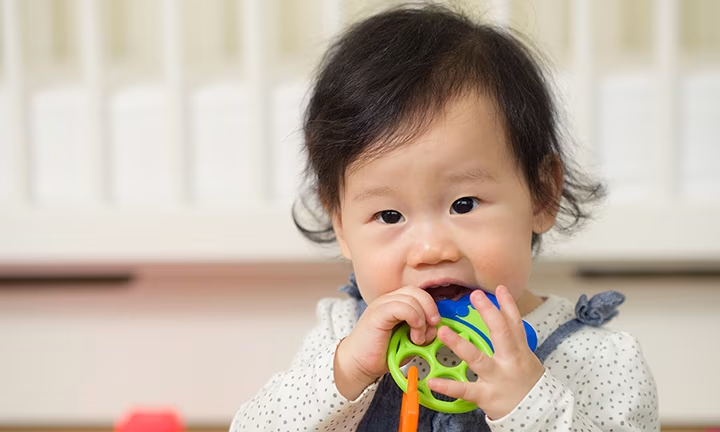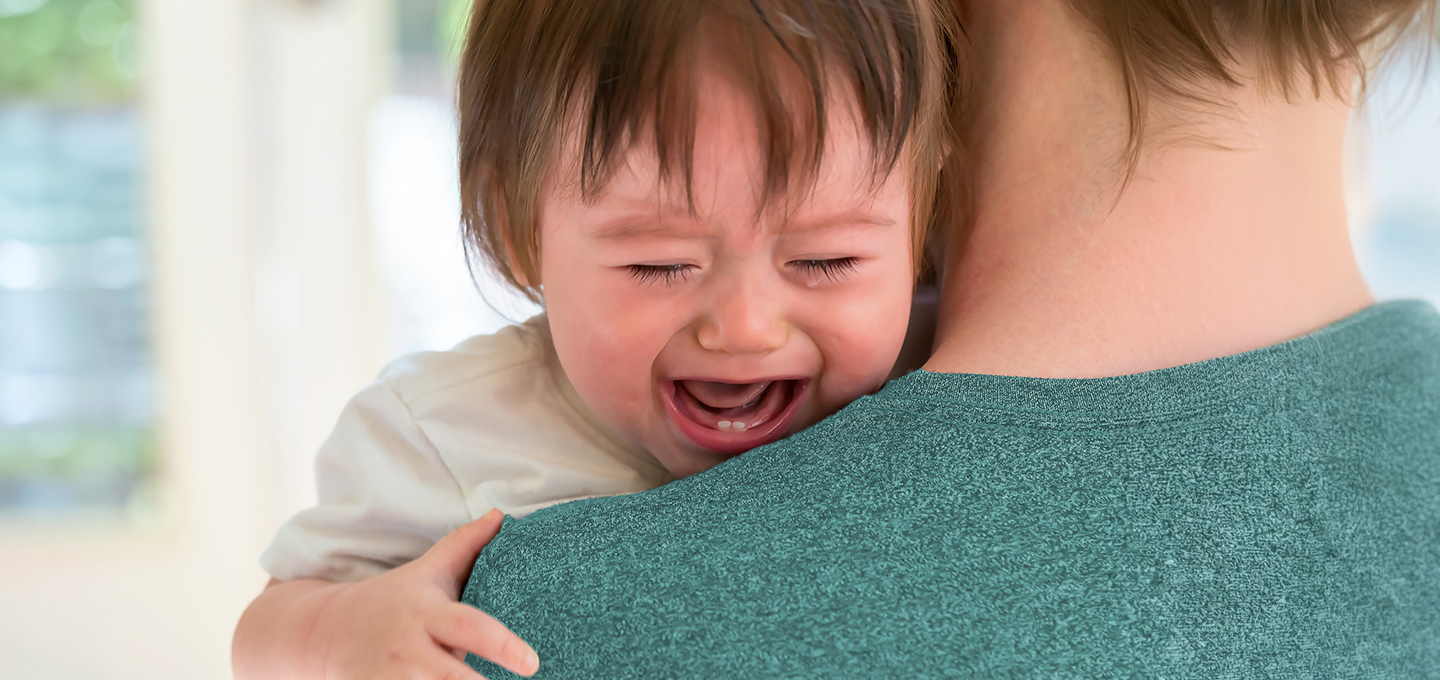
When Do Babies Start Teething? Signs, Timeline, & Care Tips


Wondering “When do babies start teething?” Most babies begin teething between 4 and 7 months of age, though it can start as early as 3 months or as late as 12 months. The first teeth to appear are typically the bottom front teeth (lower central incisors), followed by the top front teeth. Every baby is different, and the timing can vary widely.
Here’s a quick overview to help you understand the teething timeline:
Signs of teething may include irritability, swollen gums, excessive drooling, and a desire to chew on objects. While teething can be uncomfortable, remedies like teething rings, cold fruit slices, or gentle gum massages can help soothe your baby.
When Do Babies Start Teething?
Most babies start teething between 6 and 12 months, but some may get their first tooth a bit earlier or later. If you’re wondering at what age babies start teething, there’s a wide range—and that’s perfectly normal.
In rare cases, a baby might be born with a tooth or have one appear in the first few weeks.
If your baby is drooling more than usual, chewing on their hands, or has tender gums, these could be early signs of teething—a clue that teething age has arrived.
How Long Does Teething Last: Understanding the Stages
If you’re wondering how long teething lasts, the full process typically stretches over about two years. Most babies will have their full set of 20 primary teeth sometime between their second and third birthdays.
But how long does teething pain last during that time? The discomfort usually comes and goes. Many babies feel sore for a few days before each new tooth breaks through. Then things tend to settle—until the next one starts to come in.
Signs and Symptoms of Teething: What to Expect
Teething can look different for every baby. Sometimes a tooth appears with little to no warning. Other times, signs of teething may start 3 or 4 days before a tooth pushes through the gumline.
Not sure how to tell if your baby is teething? Here are some of the most common teething symptoms to look for:
What’s Normal and What’s Not During Teething
Most babies experience teething symptoms like mild irritability, gum swelling, drooling, and a slight temperature rise. But it’s helpful to know which symptoms may not be caused by teething and could signal something else.
Here’s how to tell the difference:
If your baby has a fever, vomiting, diarrhea, or any unusual or intense symptoms, check in with your baby’s healthcare provider to rule out other causes.
Teething Timeline: From First Tooth to Full Smile
When each tooth comes in and in what order varies from child to child, but here’s a general idea of the teething timeline by age:
Top Teeth
Bottom Teeth
How to Help Soothe Your Teething Baby: Proven Remedies
Teething can be uncomfortable, especially at night, but there are simple ways you can offer some relief to a teething baby. Every child is different, so you may need to try a few options to see what helps most.
Here are two gentle teething remedies that many parents find helpful:
Avoid using pain relivers that you rub on your babies’ gums. They aren’t very helpful and can cause numbing of the back of the throat, which can result in swallowing problems. If your baby is clearly uncomfortable, talk to your healthcare provider about giving a weight appropriate dose of acetaminophen, or, if your baby is older than 6 months, ibuprofen.
These tips may also serve as home remedies for a teething baby at night, when discomfort tends to interrupt sleep. If you're not sure how to help your teething baby or your little one seems especially unsettled, your baby’s healthcare provider can help guide you.
Best Teething Toys for Babies
When your baby is teething, having something safe to chew on can make a big difference. Teething toys help apply gentle pressure to the gums, which can ease discomfort and offer a welcome distraction.
One common option is a teething ring, which many babies find soothing, especially when it’s chilled in the fridge for extra relief. Just make sure it’s not frozen solid, which could be too harsh for your little one’s sensitive mouth.
The best teething toys for babies are easy to grip, made from baby-safe materials, and designed specifically for soothing sore gums. Silicone or rubber textures tend to be favorites, and some are shaped to reach the back of the mouth as molars start to come in.
Always check the label to ensure the toy is age-appropriate and supervise your baby during teething play.
Just like teething, your baby’s growth is full of milestones. Track their progress with our easy-to-use Growth Chart Calculator.
Caring for Your Baby’s New Teeth: Essential Tips
It’s important to start caring for your baby’s teeth (or tooth) as soon as the first one pokes through. Those baby teeth must last several years before they’re replaced with adult teeth, and establishing good dental hygiene habits early on will help set your little one up for healthy teeth and gums throughout their life.
Taking steps to prevent cavities and tooth decay in the baby teeth is just as important as it is with adult teeth, because decay in these teeth can affect the permanent teeth that follow and cause other dental problems like pain and infections. Read on to discover when to start brushing your baby’s teeth and more care tips.
Brushing Your Baby’s Teeth
Wondering when to start brushing baby teeth? Start as soon as the first tooth comes in. Regular brushing—twice a day—is key for keeping baby teeth clean and healthy.
Tips for brushing your baby’s teeth:
Diet
Your little one’s diet is a big part of dental health. Avoid giving your child sugary drinks like fruit juice and sodas, or sticky-sweet snacks like gum, toffee, and sticky caramel. Also, don’t let your baby fall asleep with a bottle or sippy cup of milk, formula, juice, or any other sweet drink, as this can cause the sugary liquid to pool in his mouth and lead to tooth decay.
For more on caring for your baby’s teeth, check out our article on dental care for children.
Dental Checkups
Plan your baby's first dental visit within 6 months of the first tooth, or by 12 months old—whichever comes first.
Your baby's healthcare provider will also check their mouth during regular well-baby visits. And of course, you can always schedule a dentist appointment if you have any concerns in the meantime.
When to See Your Baby’s Healthcare Provider
If your little one has symptoms like fever, diarrhea, or unusual irritability, and you’re unsure if it’s related to teething or something else, it’s best to check in with your baby’s healthcare provider. They can offer a proper diagnosis and ensure nothing more serious is going on.
You should also reach out if your little one seems to be in significant discomfort from teething. The provider may suggest safe ways to manage pain, but avoid numbing teething gels, which may be harmful to infants.
Finally, contact your baby’s provider or dentist if your child has a tooth injury, like a chipped or broken tooth. It’s always safer to have it checked, even if your baby seems unbothered.
Interesting Facts About Baby Teeth
FAQS AT A GLANCE
Signs may include fussiness, disrupted sleep, swollen or tender gums, lots of drooling, and a strong urge to chew on fingers or toys. These teething symptoms often show up a few days before a tooth breaks through the gumline.
The Bottom Line
Teething can be a tough phase—for your little one and you—but it’s also a meaningful milestone. Those little teeth will soon help your child bite into new foods and support their speech and development.
If that first tooth hasn’t shown up yet, hang in there—it’s likely just around the corner. Each new arrival brings your baby one step closer to a full, confident smile.
Caring for those tiny milk teeth now sets the stage for a lifetime of healthy habits. Before you know it, your little one’s grin will be full of some of the cutest, brightest teeth you’ve ever seen.
Don’t forget to check out the Pampers Rewards App—it’s a great way to earn rewards and unlock digital offers just by purchasing diapers and wipes.
- American Academy of Pediatrics. Caring for Your Baby and Young Child: Birth to Age 5, 7th ed. (New York: Bantam Books, 2019).
- Cleveland Clinic. “Teething Remedies for Your Baby’s Aching Mouth.”
- Cleveland Clinic. “Teething/Teething Syndrome.”
- Healthy Children. “Baby’s First Tooth: 7 Facts Parents Should Know.”
- Healthy Children. “Drooling and Your Baby.”
- Healthy Children. “Why It’s Important to Take Care of Baby Teeth.”
- Kids Health. “Teething Tots.”
- Kids Health. “Your Teeth.”
- Mayo Clinic. “At What Age Do Children Start Losing Their Baby Teeth?”
- Mayo Clinic. “Teething: Tips for soothing sore gums.”
- Mouth Healthy. “Eruption Charts.”
Read more about Baby
Related Articles
Join a World of Support
through Pregnancy and Parenthood.
TRACK WITH TOOLS
LEARN WITH EXPERTS
GET REWARDED








